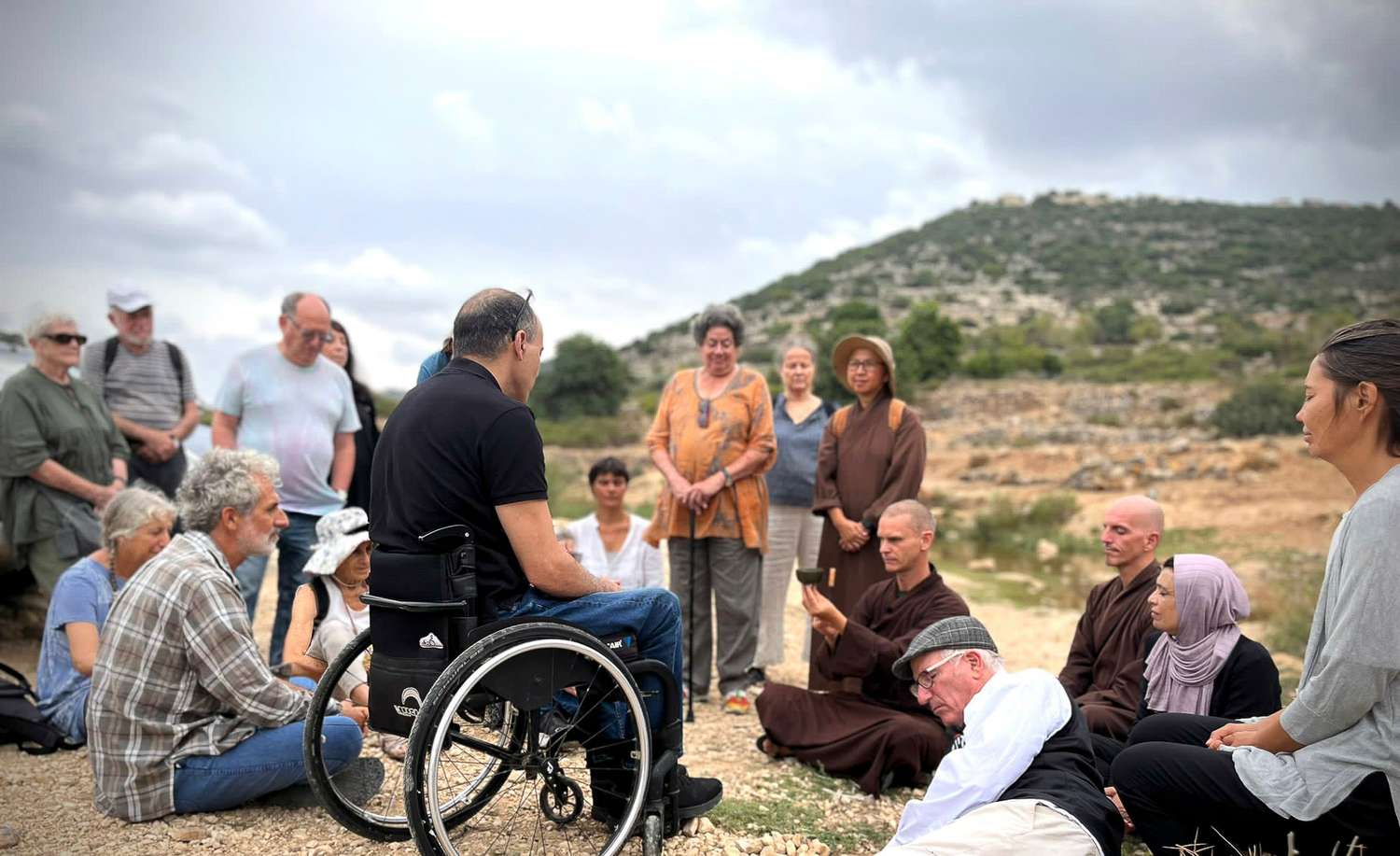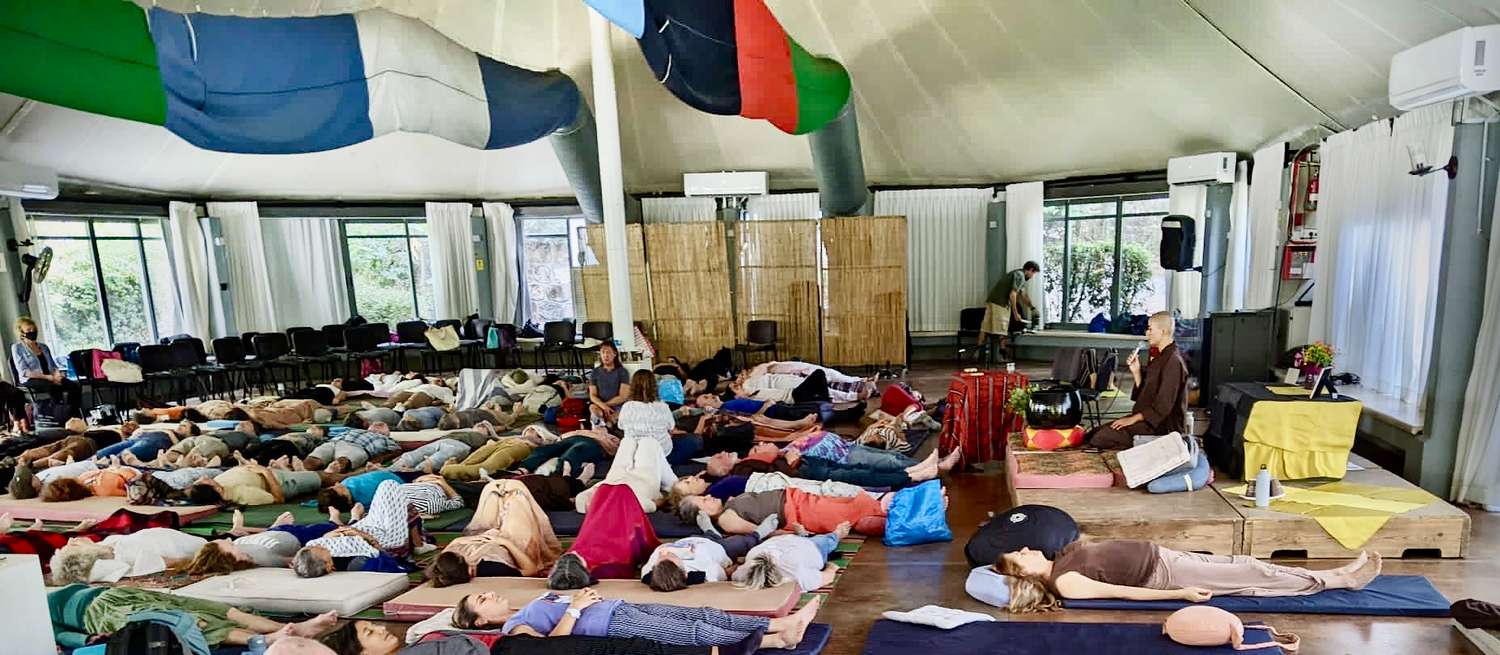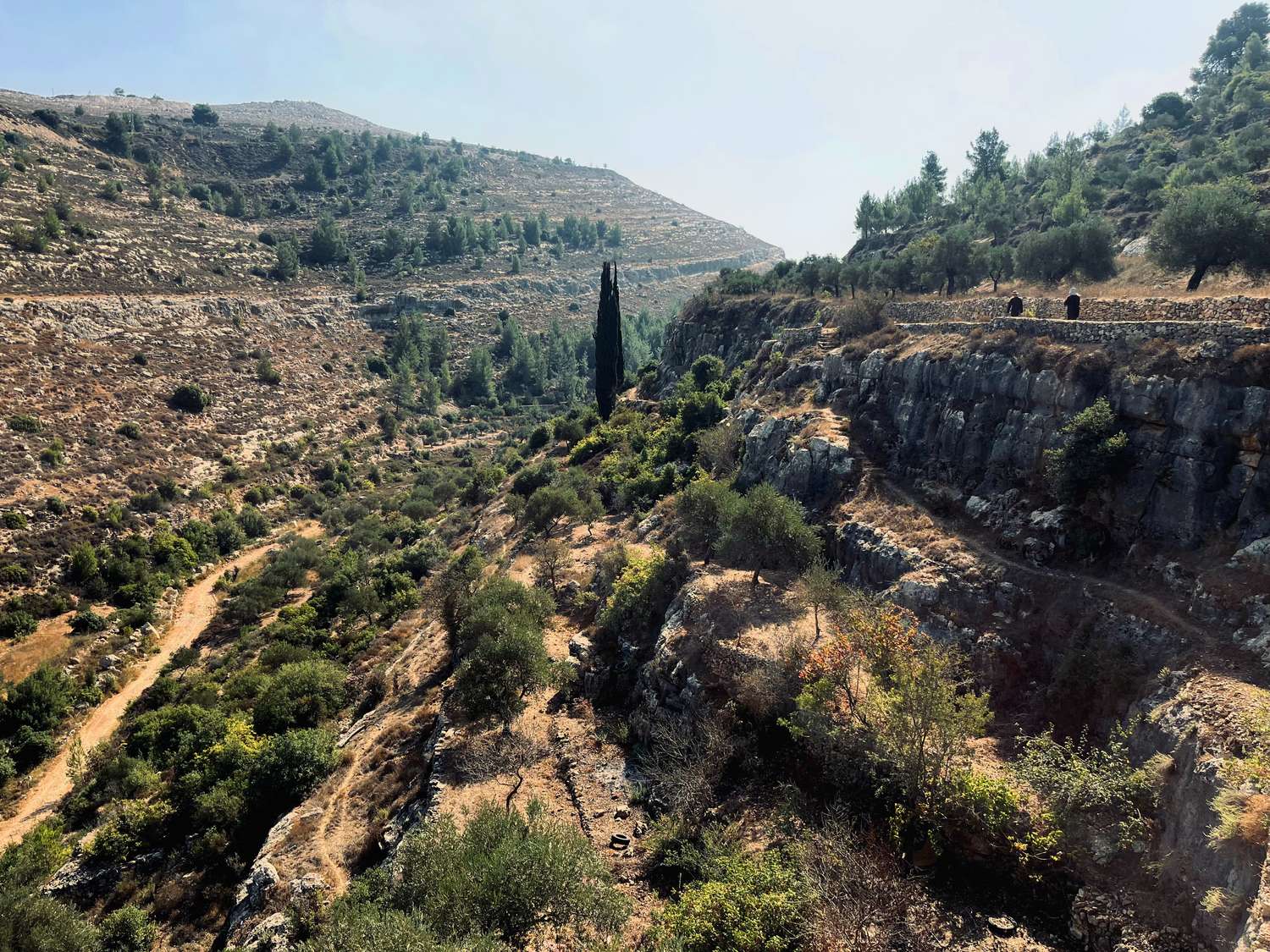Land of the Ancient Olive Trees
Sister Chân Trăng Linh Dị
11 October 2023, Neve Shalom, Wahat Salam
Dear respected Thay,
It is your continuation day today.
We, four of your monastic children, are in the Holy Land as the war erupted four days ago. We are safe. We have water, food, shelter, and dear sangha friends. Yet a mere 50 kilometres away, there is no more water, food, or safe haven. We know children are dying. Day and night we hear the missile interceptors and feel the vibration of the ground as missiles land. I close my eyes every time and pray fervently, “May there be peace and compassion in the hearts of all.”
Life feels like a sand painting that has just been turned upside down and we do not know how the next moment will manifest.
I am also afraid, dear Thay. I do not know if I will see my mum and dad again. Lying there in the dark, my breath deep and even, I see you, standing amidst the village ruins and urging the villagers to rebuild again and again. I see the sangha touching the Earth in a sea of golden sanghati robes. And I hear my grandmother, who brought seven children out of a war zone, smiling and whispering: “You will be alright, my child. You have my strength.”
We came to the Holy Land to understand life here, to help bring people together, to breathe, walk, and listen to each other in peace.

There was the day when we walked in Wadi Khana, an oasis of ancestral olive groves. Issa Souf, a Palestinian peace activist who is paralyzed after having been shot, shared with us that this lush valley was once open for grazing goats and cultivating olives. In the past few years, illegal settlements sprung up on its hills and Palestinians no longer had the rights to cultivate olives there.
It was a Jewish holiday that day and many settler families picnicked by the stream. Young fathers held babies in one arm and toted machine guns in the other. We looked at each other. I breathed peacefully and kept my gaze open and friendly. This was their vision of happiness and my taking sides would only strengthen seeds of discrimination and separation.
Our group of peace activists and sangha friends walked stably and calmly in the oasis. Aisha, Issa’s wife, later shared that the practice of meditation allows her to face each day anew. She worries for her two children and when they go to school in the morning, she never knows if they would return alive.
We were humbled by the depth of their suffering and strength to persevere. The people of this land are of the same elements as the thousand-year-old olive trees that stand stoic on parched hills and continue to bear fruit.
“How do we hold the sorrow in our hearts when it feels unbearable?” “How do we express our pain without hurting the ones listening?” “How do I answer my child each night when she asks me if a peace treaty has been signed?”
We didn’t have answers, but we listened with all our compassion and held the space for each person to speak their heart. We brought “tools” from our life in Plum Village to soothe those aching hearts.
There was the day we went to the Dheisheh refugee camp and met a group of young Palestinian women living there. Most of them had between four to nine children and they were exhausted from taking care of their families. I spread out yoga mats and invited them to lie down for deep relaxation. They giggled and hesitated. Fortunately, we had foreseen this awkward moment and had asked the brothers to not come that day. Nonchalantly, I lied down first to “demonstrate.” They eagerly followed. With continuous guidance and songs, they managed to stay calm and relaxed for half an hour, then sat up with beaming smiles and many thumbs up.
We met many people from all backgrounds who understandably did not feel safe. One small moment left a strong impression on me. We were in Bethlehem. It was lunchtime and the sisters looked to buy simple falafel schwarmas (sandwiches). Two local boys of around 12 years old were nearby, holding newly bought schwarmas. I pointed to one of their scharwmas, smiled and asked in a friendly voice: “Where is this from?” The boy immediately clutched the schwarma to his chest and quickly stood behind his friend, his eyes glaring with fear.
Oh dear child. How you must have endured hunger and struggled for food throughout your young life! I have never experienced a single day of hunger in my whole life! Yet, knowing that children like you are in hunger and fear everywhere, I am even more determined to live and share a simple life.
When we met the Catholic priest and peace activist Sami Awad, he shared that through his years of working with peace activists, he realized many were not creating conditions of peace, but of security – that their peace activism was driven by fear.
The adults who came to our retreats and Mindfulness Days hid their fear better. Nonetheless, we saw that some were very troubled when their “safe sitting spot” was taken by another; some could not feel at ease in deep relaxation while others were easily startled at sudden sounds.
We simply walked, feeling the weight of our body shifting from side to side, feeling the ground beneath our feet, feeling all the sensations in the body that were not “fear.”
We simply sang, “I’ve got peace like a river, I’ve got peace like a river…” digging deep into the Earth to touch its vast embrace, and sang from this solid and inclusive place.
We simply ate in mindfulness, giving thanks to the miracle of being nourished. Giving thanks to sangha friends who sheltered and fed us even when they themselves did not know if there would be food as the war continued.

Wherever we went, people remembered the harmony of our group above anything else we shared with them.
I was surprised how the Plum Village daily practices such as listening with openness, speaking without blaming, checking our own perceptions, taking time to understand, and letting go have permeated our beings. Though the four of us joked that on any given day, only three of us were solid; we certainly benefited from the fruit of those practices.
Harmony often asked of us to refrain from saying or doing certain things, and it wasn’t easy.
Like the night we first tried to drive into the West Bank: the navigation system tried to reroute us, the main checkpoint was closed, the internet signal was fading in and out, and we couldn’t read the signs in Hebrew. It also became apparent that some of us resorted to information and technology to solve problems, while others preferred speaking to people.
We knew it wasn’t a moment for “being right,” but for focussing collectively, so we stopped giving diverse suggestions. Instead, we sat quietly to breathe and remain aware of the surroundings and listened to the needs of the driver so we could support, rather than overwhelm. And bless our elder sister who set an example for all of us – she remained silent the entire time!
Harmony also asked of us respect and humility, in the smallest ways.
One day, in the middle of a retreat, our elder sister asked me, “Su em (younger sister), do you think we can chant ‘May the Day be Well’ tomorrow?” “Sure!” “Could you please check with the brothers?” “Ok.” I quickly sent out a message to the brothers in our message group, “Dear brothers. Tomorrow morning, we will chant ‘May the Day be Well.’”
Seeing that message, my elder sister laughed and gently said to me, “Su em, it is not very kind or respectful to speak to the brothers like that. We are collaborators and we should always ask each other for their ideas rather than tell or demand. If we are mindful of these small things, we will not let tension build up during the tour.” I bowed in gratitude and typed out another message, “Dear brothers, apparently it is not very respectful to just tell you what to chant … so … are you ok to chant ‘May the Day be Well’ tomorrow? ☺”

Harmony is born from understanding.
There was the day three of us went hiking through the olive groves along the Terraces of Battir. We had just held a Day of Mindfulness the previous day, so I asked the brothers for feedback on my Q&A responses. Though they shared in a very constructive and calm way, I somehow felt pained. Unfortunately, at that moment a group of local visitors passing by, asked if I was from China and eagerly crowded around me to take photos. Part of me wanted to run away as far as possible and didn’t care if it would worry the brothers, but the “practitioner” part of me was stronger. I walked quietly to one olive tree a little away, sat down, and breathed while gazing at the beautiful leaves. When the visitors had gone, I walked back to where the brothers were. They were also sitting.
“Would you like to share?” one asked. Tears welled up and it dawned on me why I was pained, “Being here in the West Bank, so many things are so similar to parts of China. The poor villages with small concrete houses, the plastic bags everywhere, the ‘flexibility’ of road rules … And hearing feedback from a ‘white’ person made me feel 12 again. I had just arrived in Australia and didn’t understand English. When the other children teased me, a voice inside was crying out ‘I am not stupid!’”
“Thank you dear Sister, for sharing. You know that you are deeply appreciated, and the beauty of our community is that we can be mirrors for each other. It is exactly moments like this when we can heal and grow.”
Yes. I understood.
Dear respected Thay, thank you for cultivating a community of understanding, harmony, peace, and compassion. You have seen the immense suffering everywhere on the land. You have given us practices to keep our hearts open and face suffering with courage.
With gratitude,
Your disciple – Trăng Linh Dị